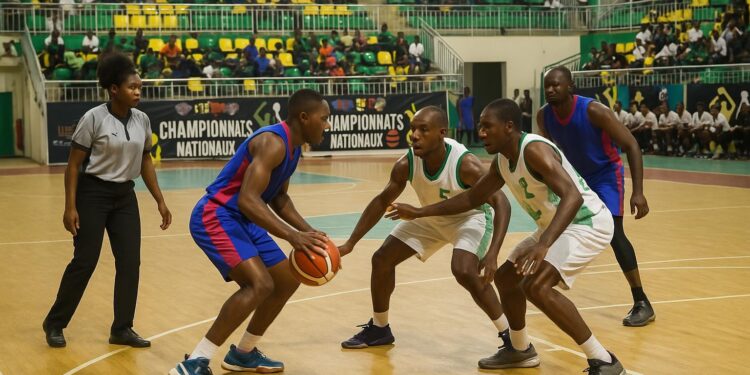Brazzaville Hosts 41st National Basketball Championships
For eight August days the bustling Gymnase Max-Stade in Brazzaville echoes with whistles and drums as the Republic of Congo’s 41st national basketball championships unfold. Nineteen senior and junior teams—men and women—represent nearly every department, producing a rare tableau of national cohesion under a single roof.
Organisers note that the tournament, last held at full scale before the pandemic, arrives amid renewed public appetite for live sport. Local daily Les Dépêches de Brazzaville reports ticket demand exceeding earlier editions, a sign that basketball’s domestic following is recovering after two challenging seasons (Les Dépêches de Brazzaville, 18 August).
Government’s Vision for Sporting Diplomacy
Congolese authorities frame the championship as more than a contest. “Sport remains a bridge among our regions and our partners,” Director General of Sports Jean Robert Bindele declared in his opening address, urging athletes to embrace Olympic values and thereby project a disciplined national image across Central Africa.
Officials at the Ministry of Foreign Affairs highlight that the event coincides with negotiations to host future Central Zone qualifiers for FIBA Africa. By demonstrating organisational reliability, Brazzaville aims to strengthen its candidacy and align with President Denis Sassou Nguesso’s strategy of leveraging soft power through cultural and sporting exchanges (Ministry communique, 17 August).
Scouting Future National Stars
The Congolese Basketball Federation, Fecoket, led by Fabrice Makaya Mateve, uses the championship as a talent incubator. Federation scouts disperse through the bleachers, tablets in hand, logging statistics to feed a centralised database financed with support from the Fédération Française de Basket-Ball.
Makaya argues the data-driven approach will shorten the pathway from provincial courts to continental arenas. “This week is our most efficient laboratory,” he told Radio Congo. Players flagged for exceptional efficiency ratings will be invited to a November camp that could shape Congo’s roster for AfroBasket 2025 qualifiers.
Opening Games Set Competitive Tone
The mood turned electric on opening night when Brazzaville’s AVR edged Pointe-Noire’s BBS 68-57, capitalising on 17 fast-break points. Later, perennial powerhouse Interclub dismantled the Diables Noirs 72-38, prompting analysts on Télé Congo to predict a deep run for the capital side.
In the junior bracket, BBS extracted narrow revenge, outlasting the Diablotins 77-76 in a thriller sealed by a baseline jumper with two seconds left. Women’s play opened with ECB’s composed 37-19 victory over the Diables Noires, their stifling 2-3 zone forcing 22 turnovers.
Infrastructure and Safety Considerations
Brazzaville’s municipal authorities refurbished the arena’s parquet floor and installed modern shot clocks procured through a Chinese development grant. The upgrades comply with FIBA Level 2 standards, permitting potential international broadcasts, according to a technical report shared by the Confederation of African Basketball.
Security, another diplomatic litmus test, remains tight yet unobtrusive. The national gendarmerie coordinates with private stewards, deploying crowd-management protocols refined during the 2015 All-Africa Games. No incidents were reported during the first forty-eight hours, a record praised by visiting sports-diplomacy observers from the African Union Commission.
Regional Implications for Central Africa
Landlocked neighbours—Central African Republic and Democratic Republic of Congo—sent delegations to observe logistics, signalling a regional appetite for cooperative tournaments. Analysts at the Institute for Security Studies suggest such sporting linkages can soften political frictions by broadening channels of civilian engagement.
Further afield, Rwandan media note parallels with Kigali’s own basketball renaissance, financed by public–private partnerships. Brazzaville officials quietly study that model, aware that the BK Arena now hosts NBA-affiliated events. Replicating even part of that success could reposition Congo as a cultural hub along the Congo River corridor.
Economic Pulse Around the Arena
Local entrepreneurs seize the moment. Temporary stalls sell cassava chips, jerseys and mobile-payment top-ups, weaving the informal economy into the event’s fabric. The Chamber of Commerce estimates an incremental turnover of 180 million CFA francs over the week, modest yet meaningful for micro-vendors.
SPNC Distribution, recently named logistics partner, provides branded hydration stations, reinforcing the government’s preference for public-private synergy. Economists at the University of Marien Ngouabi argue such contracts, though small, cultivate a domestic value chain that reduces dependence on imported sports equipment.
Voices from Players and Officials
AVR captain Brice Ndouna credits national unity for his team’s composure. “Playing under one flag reminds us the jersey is heavier than we are,” he said after scoring twenty points. Across the aisle, BBS coach Élise Makaya praised officials for punctual scheduling, a recurrent challenge in previous editions.
Spectators echo the sentiment. “The organisation feels smoother; even the wi-fi works,” remarked telecommunications minister Léon Juste Ibombo from the stands, alluding to improved digital infrastructure freely accessible to fans, a gentle nudge toward Congo’s broader digital-economy ambitions.
Outlook for Continental Competitions
As the knockout rounds loom, federation strategists already forecast line-ups for next spring’s Basketball Africa League qualifiers. Success in Brazzaville would reaffirm Congo’s historic contribution to African hoops, epitomised by the 1983 Afrobasket bronze. With judicious investment and sustained political will, officials believe the current revival can outlast the final buzzer heard this 24 August.












































